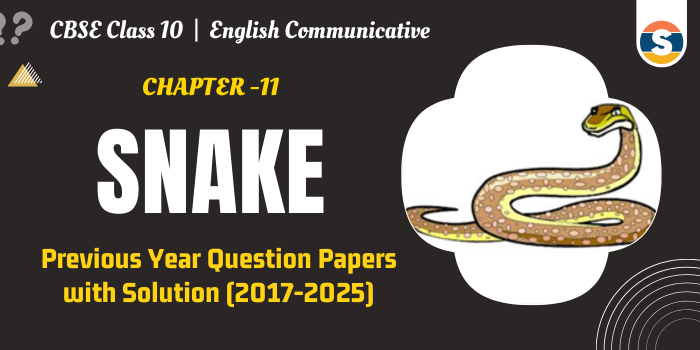CBSE Class 10 English Communicative Chapter 11 Snake Question Answers from previous years question papers (2017-2025)
Snake Previous Year Questions with Answers – Question Answers from Previous years Board Exam Question papers provide valuable insights into how chapters are typically presented in exams. They are essential for preparing for the CBSE Board Exams, serving as a valuable resource.They can reveal the types of questions commonly asked and highlight the key concepts that require more attention. In this post, we have shared Previous Year Questions for Class 10 English Communicative Chapter11, “Snake”.
Questions from the Chapter in 2025 Board Exams
Q1. From the poems ‘The Rime of the Ancient Mariner’ and ‘The Snake’, discuss how the characters, the albatross and the snake view human attitude and perspective towards creatures. (150 Words) (8 marks)
Ans. In both the poems, we see the involuntary response of the human involved – to hit and try to kill the animal. This shows the inner voice of education and impulse which instructs humans to destroy other species.
In the poem ‘The Rime of the Ancient Mariner’, the mariner shoots the albatross bird and kills it for no reason. The bird is a holy messenger, it is considered a good omen for the sailors. However, the mariner kills it on an impulse. The innocent albatross bird will consider humans to be heartless, the indiscriminately misuse the powers and weapons for harming and killing harmless animals.
In the poem ‘Snake’, the narrator hits the snake with a log of wood because his inner voice of education repeatedly coerces him to kill the snake and even challenges his manlihood for not doing so. He is termed a coward for not hitting the snake. It is said in Sicily that black snakes are harmless but the golden ones are venomous. Although the snake means no harm, it is simply there to quench its thirst and retreats back home, the narrator hits it. This will make the snake feel that humans are dangerous and so mean that they try to kill innocent and harmless animals.
For All Class 10 English Lesson Explanation, summary, Character Sketch, MCQs and Previous Years Question Papers Click here
Questions which came in 2024 Board Exam
Q1. Describe the poet’s (D.H. Lawrence) dual attitude towards the snake. [30 – 40 words]
Ans. The poet has a dual attitude towards the snake. On the one hand, he treats it as a guest and even compares it to God. On the contrary, his inner voice of education compels him to hit and kill the snake which is considered dangerous.
Questions that appeared in 2020 Board Exams
Q1. Why did the poet wait for the snake to drink first from the trough? [30 – 40 words]
Ans. The poet thought that a snake came to the trough before him. He considered the snake as a guest and felt honored that someone had come to this place to drink water and hosted him very well considering him as a guest.
Questions from the Chapter in 2018 Board Exams
Q1. In the poem “Snake”, why does the poet say “I have something to expatiate.”? [30 – 40 words]
Ans. The poet says so because he tried to kill the snake though it did not cause any harm to him. He was feeling guilty for this act and knew that he would have to amend things to be forgiven for this sin, just like the mariner who killed the albatross bird.
Questions from the Chapter in 2018 Board Exams
Q1. Why did the poet wait for the snake to quench its thirst first? [30 – 40 words]
Ans. The poet waits for the snake to quench its thirst because he considers it to be an honoured guest. Besides, as the snake had come before him, it was first in the order.
Q2. Whenever we act against the voice of our conscience, the result is suffering. Explain with reference to the poet’s action against the snake and its consequences. [80 – 100 words]
Ans. When we act against the voice of our conscience, we suffer. The poet’s
inner voice advised him to treat the snake as if it were a guest. He wished for peaceful coexistence with other species. But, ignoring the voice of his conscience and without thinking about the consequences of his actions, he struck the snake. He quickly regretted his careless action. His conscience pricked him for hitting the snake unnecessarily, despite the fact that it had not harmed him in any way. He was overcome by a sense of sin and guilt. He desired to make amends and beg forgiveness.
Related:
- Snake Class 10 English Summary, Explanation, Difficult Words
- Snake Question Answers
- Snake Character Sketch




